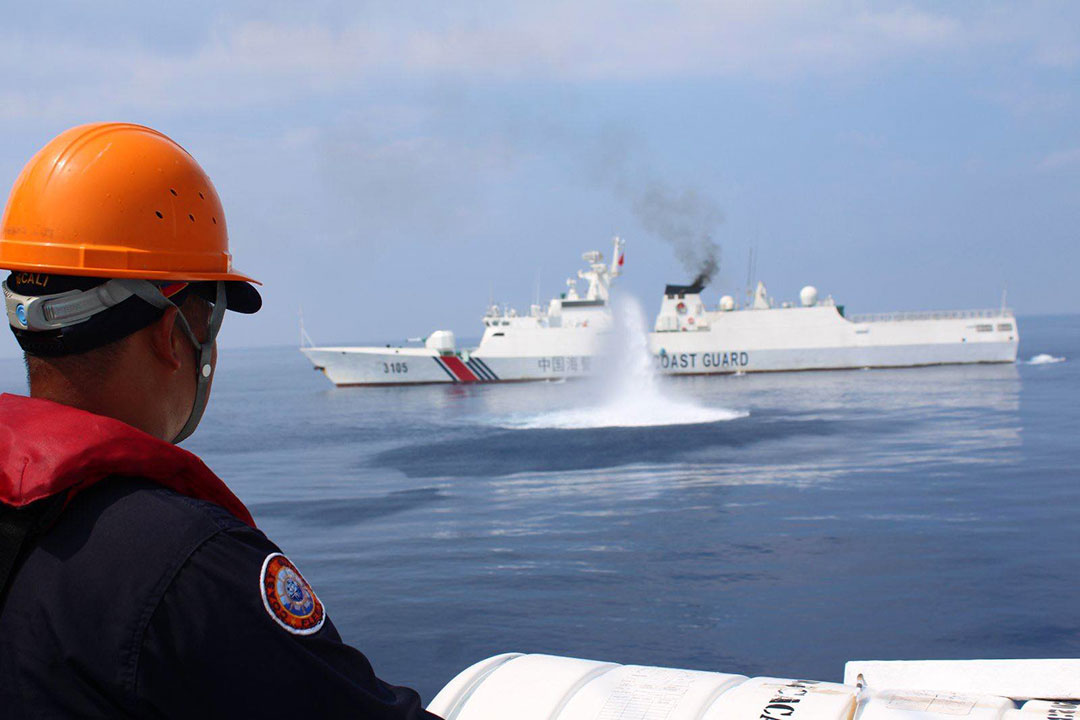Marcos says Philippines won’t fire water cannons at Chinese vessels

By Kyle Aristophere T. Atienza, Reporter
PRESIDENT Ferdinand R. Marcos, Jr. on Monday said the Philippines would never fire water cannons against Chinese Coast Guard (CCG) vessels in the South China Sea in retaliation to avoid worsening tensions.
“What we are doing is defending our sovereign rights and our sovereignty in the West Philippine Sea, and we have no intention of attacking anyone with water cannons or any other such offensive,” he told reporters on the sidelines of an event in Manila.
The Chinese Coast Guard backed by maritime militia ships has been firing water cannons at Philippine government-contracted boats delivering supplies to a Navy outpost at Second Thomas Shoal. The shoal is about 240 kilometers off the coast of Palawan province and about 900 kilometers from the nearest major Chinese landmass.
“While restraint to deescalate can be seen as rational, it also has limits given the issue of image mirroring,” Joshua Bernard B. Espeña, vice-president at Manila-based International Development and Security Cooperation, said in a Facebook Messenger chat. “Just because you think that way doesn’t mean the other also does.”
He said the Chinese Coast Guard is not a civilian agency, unlike the Philippine Coast Guard (PCG).
Mr. Espeña said failing to arm PCG vessels with water cannons could harm people on board. The Mutual Defense Treaty with the US could be triggered if anyone dies, he added.
“If anything, Marcos’ recent decision reeks of dissonance with upholding national interest,” he said. “The incumbent government is urged to reconsider the President’s decision not to arm the PCG with water cannons.”
Last week, the Philippine Coast Guard accused China’s coast guard of raising tensions by firing water cannons against two vessels supporting a mission for Filipino fishermen at Scarborough Shoal, a traditional fishing ground that is within the Philippines’ exclusive economic zone (EEZ).
“The last thing we would like is to raise the tensions in the West Philippine Sea,” Mr. Marcos said, referring to areas of the South China Sea within the country’s EEZ. The Philippines would “not follow the Chinese Coast Guard and the Chinese vessels,” he added.
“It’s not the mission of our navy, our coast guard to start or increase tensions.”
The Chinese Coast Guard last week fired jet stream water cannons against a Philippine Coast Guard ship and another owned by the fishery bureau at Scarborough Shoal, which Manila calls Panatag.
Senator Aquilino Martin L. Pimentel III has said the PCG should equip its vessels with water cannons.
“We should be able to [use] water cannons on those who we believe are violating our laws and sovereign rights up to our exclusive economic zone,” he said last week.
The PCG said its ship sustained damage worth more than P2 million after China’s water cannon attack.
The Philippines has a Mutual Defense Treaty with the US, and security experts have said China’s use of water cannons is a form of harassment that stops short of a military confrontation but gets the job done by establishing control over the geographical space.
Armed Forces of the Philippines chief Romeo S. Brawner, Jr. last year said China was using its coast guard instead of its Navy force to harass Filipino vessels because “they want to act short of declaring war.”
He said the Chinese Coast Guard is not a civilian agency because it is under China’s Central Military Commission, adding that an attack, even with just a water cannon, on a Navy ship could be interpreted “as an act of war already.”
Mr. Brawner in December was aboard a Philippine resupply boat that was hit by water cannons fired by the Chinese Coast Guard.
The PCG was under the Department of National Defense before it was transferred to the Office of the President on March 30, 1998 through an order issued by the late President Fidel V. Ramos.
Less than a month later, Mr. Ramos transferred the PCG to the Department of Transportation and Communications, which was split into two into separate agencies in 2016 through a law signed by the late President Benigno S.C. Aquino III.



